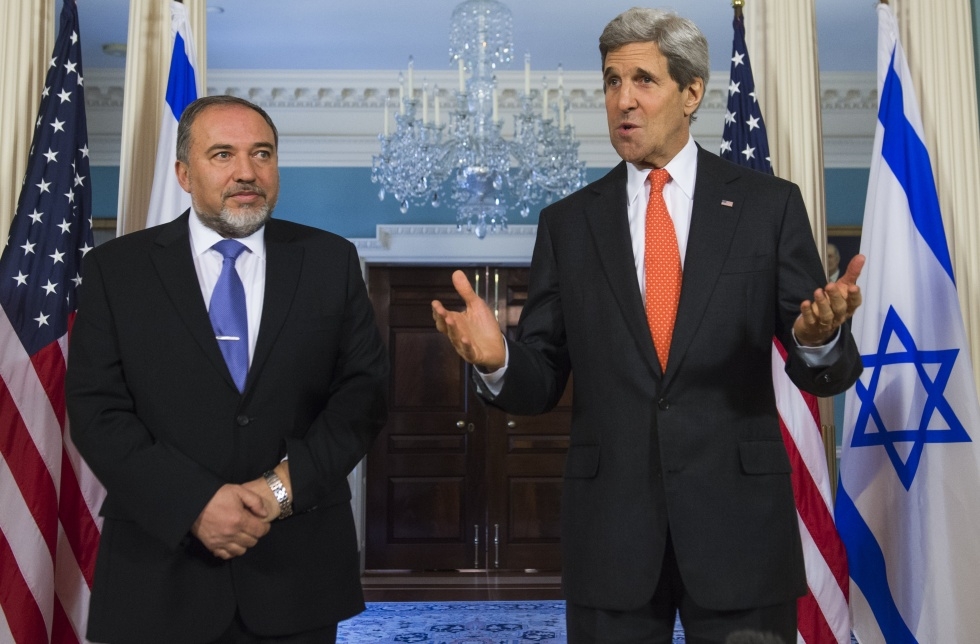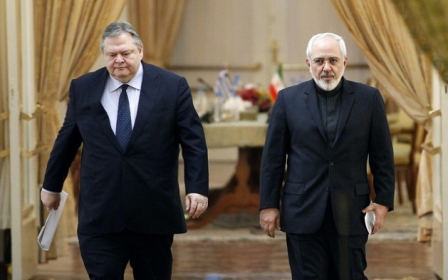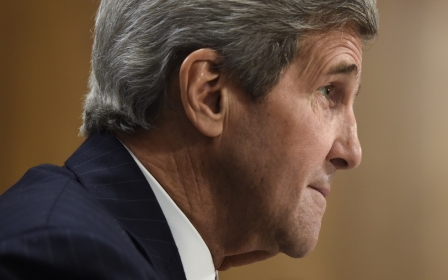US-Iran deal in Israel's interests

The United States and Israel appear to be set on a collision course due to the failure of the Israeli-Palestinian peace talks last month, pesky allegations about Israel’s spying on the US, and, as talks resume in Vienna this week, the looming prospect of a finalised Iran nuclear deal.
To the Obama administration, Israel’s hardline approach to the Palestinians has cultivated little sympathy. This was best evidenced by Secretary of State John Kerry’s private musing that a failure to reach a peace settlement could lead to apartheid-like situation.
While Kerry took the easy way out by apologising for his comment, the stark reality of Israel’s demographic predicament is that its Jewish population is growing at a slower rate than its Arab population.
This means that in a few decades time Jews will be a minority within the Jewish state, at which point Israel will be forced to decide between abandoning the exclusively Jewish nature of the state or impose an apartheid-like system, which would either expel its Arab-Israeli population or strip them of their legal, democratic rights.
US-Israel 'blame game'
Since the failure of the peace talks, the Americans and Israelis have begun playing the “blame game”. Martin Indyk, the US envoy to the peace talks, said this week that he felt “neither side had had the stomach to make the necessary compromises”, and singled out Israel’s ongoing settlement construction on occupied territory as a particular obstacle.
Now Indyk is no dove when it comes to Israelis. In fact, John Mearsheimer and Stephen Walt accused him of being part of the “Israel Lobby” in their controversial 2007 study of US-Israeli relations, The Israel Lobby and US Foreign Policy. They also said he had acted as “Israel’s lawyer” during past rounds of peace talks with the Palestinians. This no longer seems to be the case today.
Israeli officials lashed back against Indyk this week, accusing him of hypocrisy, pointing out that he had previous knowledge about the ongoing construction of settlements, and that his presence during some meetings had “harmed progress”.
But not all is lost. This week, Palestinian President Mahmoud Abbas met with President Obama’s national security advisor, Susan Rice, who is touring the region this week with Wendy Sherman, America’s top nuclear negotiator. Abbas told Rice that he was willing to extend peace negotiations if Israel pledges to freeze settlement construction in occupied East Jerusalem and the West Bank for three months. This is an opportunity that the Israelis should act upon.
'Whiff of anti-Semitism'
US-Israeli relations deteriorated further this week, when Newsweek published a detailed report on Israeli espionage inside the United States.
Citing US intelligence officials and congressional sources, Newsweek revealed that American counter-intelligence officials had told members of the House Judiciary and Foreign Affairs committees at the end of January that “Israel’s current espionage activities in America are ‘unrivaled and unseemly,’ going far beyond the activities of other close allies”.
In typical form, Israeli officials denied the allegations and some pro-Israel groups sought to deride the Newsweek report as anti-Semetic, saying its account “had the whiff of anti-Semitism in it”.
However, top FBI officials told Newsweek that Israeli officials had been called in “dozens” of times and told to stop their espionage activities, but to no avail.
The Newsweek report could not have come at a worse time for Rice, who was hoping to smooth over the troubled US-Israeli relations following the collapse of the peace talks, Kerry’s apartheid debacle, and help pave the way for a potential Iran nuclear deal.
According to the New York Times, when Rice and Sherman met with Israeli officials they made it clear that the Iranians would almost certainly retain some enrichment capability, but this goes against Israel’s insistence that Iran not be allowed to have any form of nuclear enrichment.
Israel’s stance, however, is unrealistic. Early on, Rice and Sherman recognised that the only way to secure an agreement with the Iranians would be to give them the means to save face publicly.
After decades of chest thumping about their right under the Non-Proliferation Treaty (NPT) to enrich nuclear materials, not to mention the $300 billion spent on the program, the Iranian leadership needs a way out. By allowing a degree of nuclear enrichment, which would be coupled with an intensive inspection regime, Rice and Sherman are maximising the chances of success as nuclear talks resume this week in Vienna.
With talks entering a “critical stage”, Rice and Sherman have sought to convince both the Israelis and their congressional allies that any nuclear deal will be designed in a way that will allow the US to detect any Iranian efforts to cheat following a deal.
But Israel’s leadership is not convinced. Throughout this delicate process Prime Minister Benjamin Netanyahu has sought to undermine the American effort. This was particularly evident in January and February when his allies in AIPAC sought to undermine the nuclear talks by imposing further sanctions. Fortunately, when President Obama threatened to veto the bill, AIPAC backed off.
Certainly, Israel’s concern about Iran is understandable. Netanyahu sees Iran as an existential threat to Israel’s existence. The Iranians have also long-supported proxies, Hamas and Hezbollah, who have engaged in terrorist acts.
Given this, the Israelis felt the Americans had betrayed them by purposely keeping the backchannel to the Iranians a secret. Again, this is understandable, but so too is the Obama administration’s concern that Israel would have sought to scuttle the US-Iran talks before they got moving. After all, there has been little love between Obama and Netanyahu.
Indeed, during the 2012 US general election, Netanyahu gambled and threw his support behind President Obama’s Republican opponent, Mitt Romney, and lost. At the time, Bruce Riedel, a former senior CIA and White House official, told The Majalla, “if you wanted to know what Netanyahu’s real number one foreign policy goal is today, it is regime change on the banks of the Potomac.” Given this, why would Obama ever trust Netanyahu to keep the Iran nuclear talks a secret?
There is little question that the United States has faced considerable challenges in its relationship with Israel. The reason for this is simple: since Obama’s reelection in 2012, his foreign policy has been based on what is best for the United States and so long as Netanyahu continues to believe that America should put Israel first, this tense relationship will remain.
In reality, there is common ground. Finding a way to resolve the Palestinian question is in both America and Israel’s best interests. Similarly, resolving Iran’s nuclear program peacefully is also in Israel’s interests. Iran has considerable leverage throughout the region through its proxies, Hamas and Hezbollah. Resolving the nuclear standoff increases the chances that the United States could convince Iran to put pressure on Hamas to recognise Israel and accept a peace agreement. The Iranians can also help bring an end to the bloody civil war in Syria and seems to recognise the common threat posed by extremist groups.
Moving forward, Israel needs to trust that the United States will not abandon them and that it is in its interests to not just resolve the Palestinian question but to accept a comprehensive Iranian nuclear deal.
- Bryan R Gibson recently completed a PhD in International History at the London School of Economics and is the author of Covert Relationship: American Foreign Policy, Intelligence and the Iran-Iraq War, 1980-1988 (Praeger, 2010).
The views expressed in this article belong to the author and do not necessarily reflect the editorial policy of Middle East Eye.
Photo credit: Secretary of State John Kerry(R) and Israeli Foreign Minister Avigdor Lieberman speak to the media prior to meetings at the State Department in April (AFP)
Middle East Eye propose une couverture et une analyse indépendantes et incomparables du Moyen-Orient, de l’Afrique du Nord et d’autres régions du monde. Pour en savoir plus sur la reprise de ce contenu et les frais qui s’appliquent, veuillez remplir ce formulaire [en anglais]. Pour en savoir plus sur MEE, cliquez ici [en anglais].




